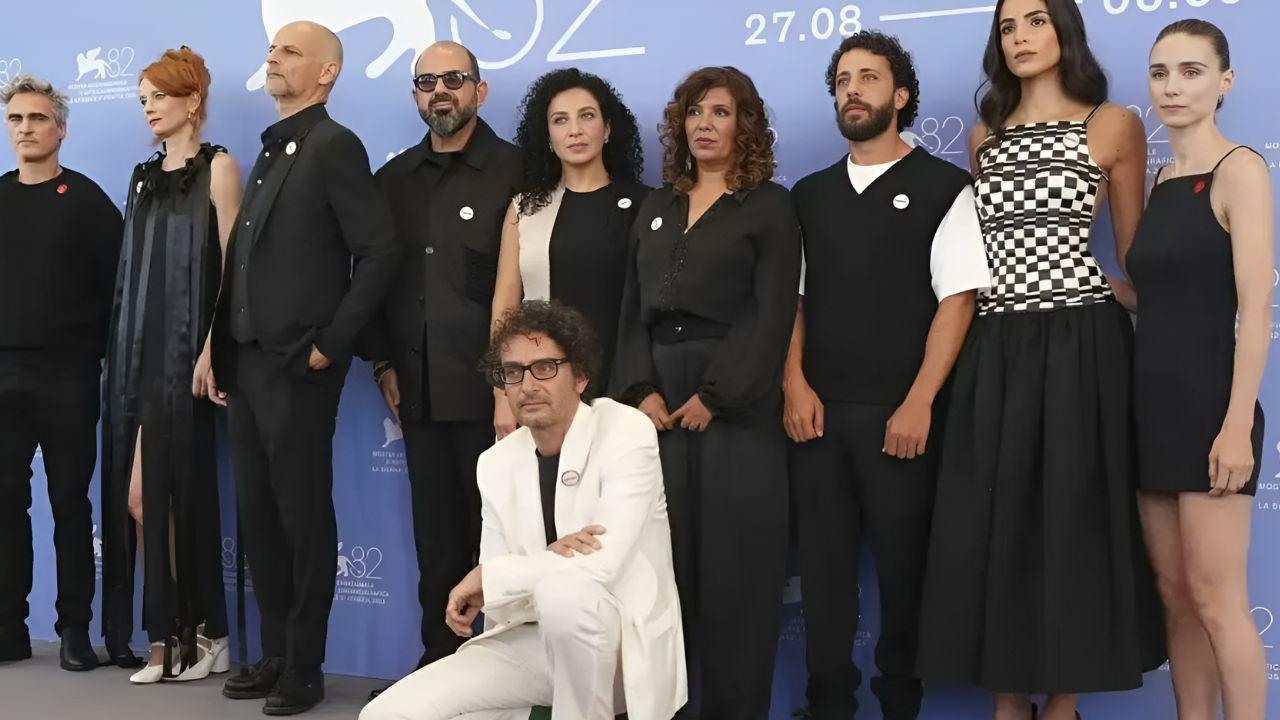
Post by : Abhinav Rana
Photo : X / Economic Times
Global Artists Rise Against Cultural Complicity
In a powerful moment of collective conscience, more than 1,800 actors, entertainers, and producers have signed a pledge to boycott Israeli film institutions, from festivals to production companies, citing their perceived role in the systematic abuse of Palestinians amid the Gaza crisis. This wave of cultural resistance echoes anti-apartheid activism before it, as artists band together not to target individuals, but to call out institutional complicity with what they describe as grave human rights violations and to stand on the side of justice.
What the Pledge Stands For
Under the banner of "boycott film institutions," signatories vow not to screen or associate with Israeli institutions they view as complicit in actions labeled by many observers as genocide or apartheid. The pledge underscores a clear boundary: while not targeting Israeli artists themselves, it refuses to lend legitimacy to institutions seen as enabling or whitewashing oppression. For these entertainers, the cultural arena is not neutral; it’s a moral stage where silence equals complicity.
Inspiration from Bordeaux to Boycotts
The movement explicitly evokes the legacy of Filmmakers United Against Apartheid, a campaign in the 1980s that boycotted apartheid South Africa’s cultural outlets. Today’s pledge seeks a similar ripple effect, reminding the world that artists historically convene not merely to entertain, but to disrupt injustice, to shape narratives where justice falters.
Hollywood Conscience on Display
Among the high-profile names attached to the pledge are a remarkable cross-section of acclaimed actors: Olivia Colman, Emma Stone, Mark Ruffalo, Tilda Swinton, Riz Ahmed, Javier Bardem, and Cynthia Nixon. Their participation signals more than symbolic alignment, it demonstrates the film industry’s weightiest voices refusing to work within systems they deem unethical, even as costs to career and visibility loom.
Boycott with Boundaries: Institutions, Not Individuals
Central to the pledge’s framing is a deliberate distinction: it does not target individual Israeli artists, many of whom may openly oppose their government’s actions. Rather, it focuses on institutions—festivals, broadcasters, production arms that are seen as institutional extensions of state narratives. This principled stance is rooted in nuance, allowing artistic freedom while refusing institutional complicity.
Growing Cultural Front in the Gaza Crisis
The pledge extends a broader cultural push to spotlight the Gaza crisis from more than political corridors. Already, the world has witnessed impactful moments: the emotionally charged screening of The Voice of Hind Rajab at the Venice Film Festival, protests at cultural venues, and filmmakers demanding platforms speak to human suffering rather than evade it. Now this pledge adds volume demanding concrete, structural silence from complicit institutions.
Israel Pushes Back, Denounces Charges
In response, Israel’s government swiftly rejected the boycott, decrying it as discriminatory. Officials defended their actions as necessary self-defense in the wake of Hamas’s devastating October 2023 attacks. For Israel, the boycott crossed from political to personal—framed as an attack on cultural exchange and nationalism wrapped in moralized rhetoric.
Artists’ Intent: Spotlight, Not Silence
For signatories, the boycott isn’t about cancel culture- it’s about accountability. By refusing to screen or participate in festivals tied to complicit institutions, they aim to shine a spotlight on injustice otherwise obscured by cultural branding and spectacle. In an age of curated realities, this boycott seeks to tear down the comfortable veneer and remind audiences: art has power, but only if moral lineages are acknowledged.
A Growing Global Movement
This boycott is part of a crescendo of cultural activism. In recent months, actors, writers, musicians, and other creatives worldwide have lent their voices to ceasefire appeals, letters demanding solidarity, and public pressure campaigns. Now, with cultural institutions in the crosshairs, the pressure reaches mainstream visibility and structural demand not just for statements, but for boycott.
Culture and Consequence Collide
The pledge compels cultural stakeholders from film festival programmers to cinema chains—to reckon with their allegiances. It forces questions: will they maintain profit-minded turf, or align with human rights imperatives? For audiences, it signals that prestige events no longer sit outside morality; they now stand either with justice or against it.
A Movement, Not a Moment
While the pledge is immediate, its implications are enduring. Just as past cultural boycotts shaped societal standards, today’s cultural laborers are asserting that ethical lines matter. If institutions evade scrutiny now, they risk being written out of both cultural and moral history sidelined by creative communities who equally shape the social conscience.
Ending Reflection: Art’s Responsibility on Edge
The actors pledge to boycott Israeli film institutions signals an inflection point. It’s art wielded as agency, culture turned toward confrontation, creativity compelled by conscience. As the hum of projectors fades and the glare of red carpets dims, one truth emerges: for these actors, true performance rests not just on screen, but in the courage to refuse when humanity calls.










Curry Powers Warriors to Nail-Biting 109-108 Victory Against Spurs
Stephen Curry's 49 points propel the Warriors to a dramatic 109-108 NBA Cup triumph over the Spurs,

India Advances to Semi-Finals After Thrashing USA in Women’s Blind T20 World Cup
India secured a dominant ten-wicket victory over the USA, advancing to the semi-finals in the Women’

South Africa's Early Advantage as India Struggles on Day Two
On Day Two, India reached 138-4 as South Africa took three early wickets, complicating matters with

Kenta Nishimoto Defeats Lakshya Sen in Japan Masters Semifinal
Lakshya Sen's journey in the Japan Masters ends after losing to Kenta Nishimoto 19-21, 21-14, 12-21

Kenta Nishimoto Defeats Lakshya Sen in Japan Masters Semifinals
Lakshya Sen's run at the Japan Masters concludes with a loss to Kenta Nishimoto in the semifinals, 1

Major IPL Trade: Jadeja Joins Royals as CSK Signs Samson
In a significant IPL trade, CSK has acquired Sanju Samson from Rajasthan Royals in exchange for Ravi